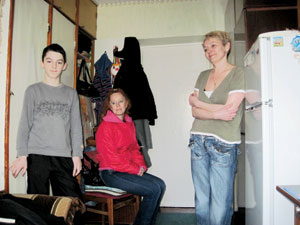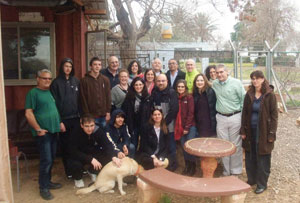 A new standing committee was established to bring together a select group of Jewish communal leaders from across the country to discuss the best ways to strengthen and build the Jewish community both nationally and throughout the world. The Jewish Federation of Greater Kansas City has been invited to join this conversation, and has now taken a seat at what is known as the Jewish Federations of North America’s (JFNA) Global Planning Table (GPT).
A new standing committee was established to bring together a select group of Jewish communal leaders from across the country to discuss the best ways to strengthen and build the Jewish community both nationally and throughout the world. The Jewish Federation of Greater Kansas City has been invited to join this conversation, and has now taken a seat at what is known as the Jewish Federations of North America’s (JFNA) Global Planning Table (GPT).
The GPT is an initiative that plans to strengthen the way the Jewish community prioritizes and takes collective action to address Jewish needs worldwide. When the discussions are over, it is hoped that the GPT will provide a new structure and process for Jewish Federations and their partners to analyze the needs of the Jewish people in Israel and 70 nations across the globe, determine priorities and assess the impact of philanthropic giving.
The discussions officially got underway earlier this year. Jerry Silverman, president and CEO of JFNA, has explained that the planners are charged with the enormous undertaking of building and establishing their Federation’s strategies on both a local and global level.
“Planning is increasingly essential to effective fundraising. The work that planners do makes a huge impact on their individual communities and across Jewish Federations,” Silverman said.
Kansas City’s record in support of overseas needs is probably one of the reasons it was invited to the GPT, said Todd Stettner, executive vice president and CEO of the local Federation.
“In addition to Kansas City’s long history of serving on the national allocations committee — first ONAD ((the predecessor to the GPT), and now with the Global Planning Table — I think JFNA recognizes how much time and effort has been put into creating a truly relevant system to allocate Kansas City dollars to our Israel and overseas partners. Our process is in line with the JFNA and Global Planning Table process, in that we have areas of excellence that provide guidelines for the programs that we fund,” said Miriam Scharf, president of the Jewish Federation of Greater Kansas City.
As a member of GPT, Kansas City is a representative of the large intermediate Federations (Federations that raise between $4 million and $11 million annually). It qualified for an invitation to the GPT because it meets the requirement of giving at least 20 percent of the funds from its annual campaign to Israel and overseas needs.
“That requirement eliminated a large group of Federations,” Stettner said, “because the fashion these days has been to give lesser amounts overseas from the annual campaign than we did in the past.”
 Kansas City raised $4.6 million through the annual campaign in 2011. Of that total, Stettner said Kansas City gave approximately 32 percent to Israel and overseas programs. An additional $1 million in supplemental campaigns was also raised in 2011 — that includes donations directed toward a specific special fund such as Joplin tornado relief or the PJ Library.
Kansas City raised $4.6 million through the annual campaign in 2011. Of that total, Stettner said Kansas City gave approximately 32 percent to Israel and overseas programs. An additional $1 million in supplemental campaigns was also raised in 2011 — that includes donations directed toward a specific special fund such as Joplin tornado relief or the PJ Library.
Like other communities, Kansas City has reduced the amount it has given to Israel and overseas needs over the years.
“Twenty years ago that figure was probably closer to 40 percent and 10 years ago it was about 34 percent,” Stettner said.
No decisions will be made this year. The various committees that make up the GPT will meet throughout 2012, sometimes in person and other times using technology such as video conferences and conference calls. New priorities are expected to be decided upon in 2013.
“The ultimate goal is to develop a system of how we look at — and address — the needs in the Jewish Federation system on a national level. But it obviously will not dictate what we do locally because that’s always going to ultimately be a local decision,” Stettner said.
Initial discussions will center on the dollars given to Israel and overseas programs and organizations. Stettner said this is not the first time the Federation system has attempted to come to a consensus in how it distributes funds to Israel and overseas concerns. That first effort, which came after the merger of United Jewish Appeal and Council of Jewish Federations, failed.
For the last couple of couple of years the two largest international Jewish organizations — Jewish Agency for Israel (JAFI) and American Jewish Joint Distribution Committee (JDC) — have lobbied to save and/or increase their funding from local Jewish Federations. The current split nationally is about 75 percent of Israel and overseas funds go to JAFI while 25 percent of those funds go to JDC.
“There never has been a resolution of the split issue,” said Stettner, referring to the failure to come to a consensus years ago.
“However, there was a decision at that time that allowed Federations to begin to designate some monies to projects that they wanted to give to in Israel and overseas. We do that here.”
For many years, Kansas City has been funding specific projects in Bulgaria and Romania in Europe and Gezer and Ramla in Israel.
“What the Global Planning Table is going to do is allow us to continue that and also to broaden it,” Stettner said. “The key thing with the Global Planning Table is it will really look at all of the overseas needs, which you can compare to what we do locally both in terms of how we view our designated overseas dollars and what we give out locally.”
Stettner is referring to the process arrived at here in Kansas City several years ago when the Jewish Federation began funding programs instead of agencies.
“We look at the needs of the community and the programs that can meet those needs. We’re not looking at how much we can give one particular agency such as the Jewish Community Center or Jewish Family Services. We look at what is the need and what program is being done to meet that need and that’s how we fund. That’s what’s going to happen on the international level,” Stettner explained.
In other words, JAFI and JDC will have particular programs funded, with fewer dollars given to the agency itself for core purposes. Due to these expected changes, JAFI and JDC also have seats at the GPT so their opinions can be heard.
“We’re going to ask what are the needs in Israel and the former Soviet Union and South America, wherever there happens to be Jewish communities, and discuss how we are going to meet those needs. If JAFI has three programs that meet those needs and we think those are the most important, then we’re going to fund those. If JDC has several programs that meet other needs, we’re going to fund those programs,” Stettner explained.


